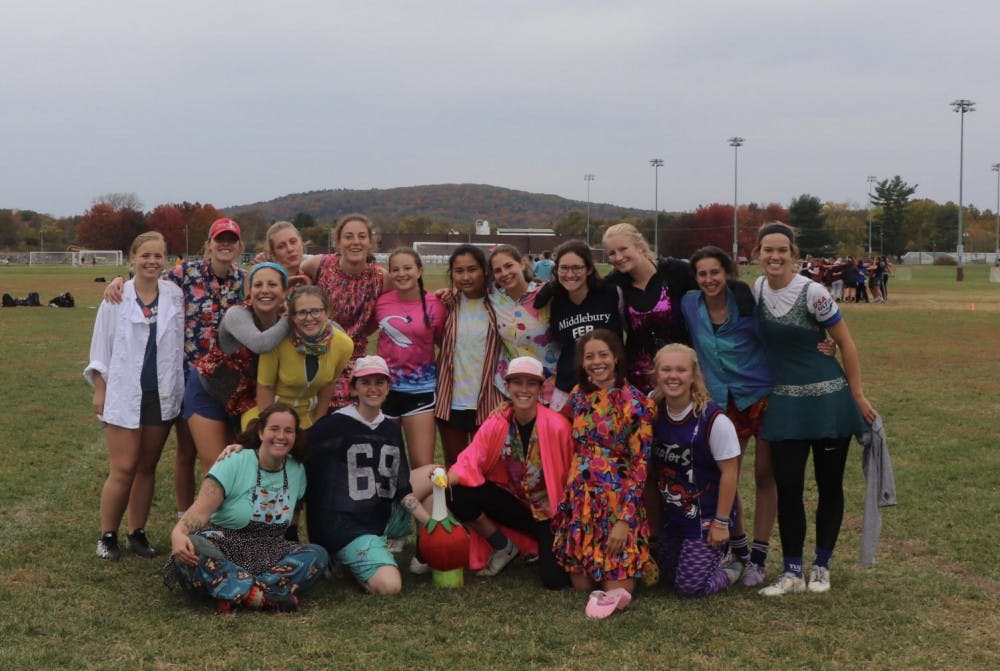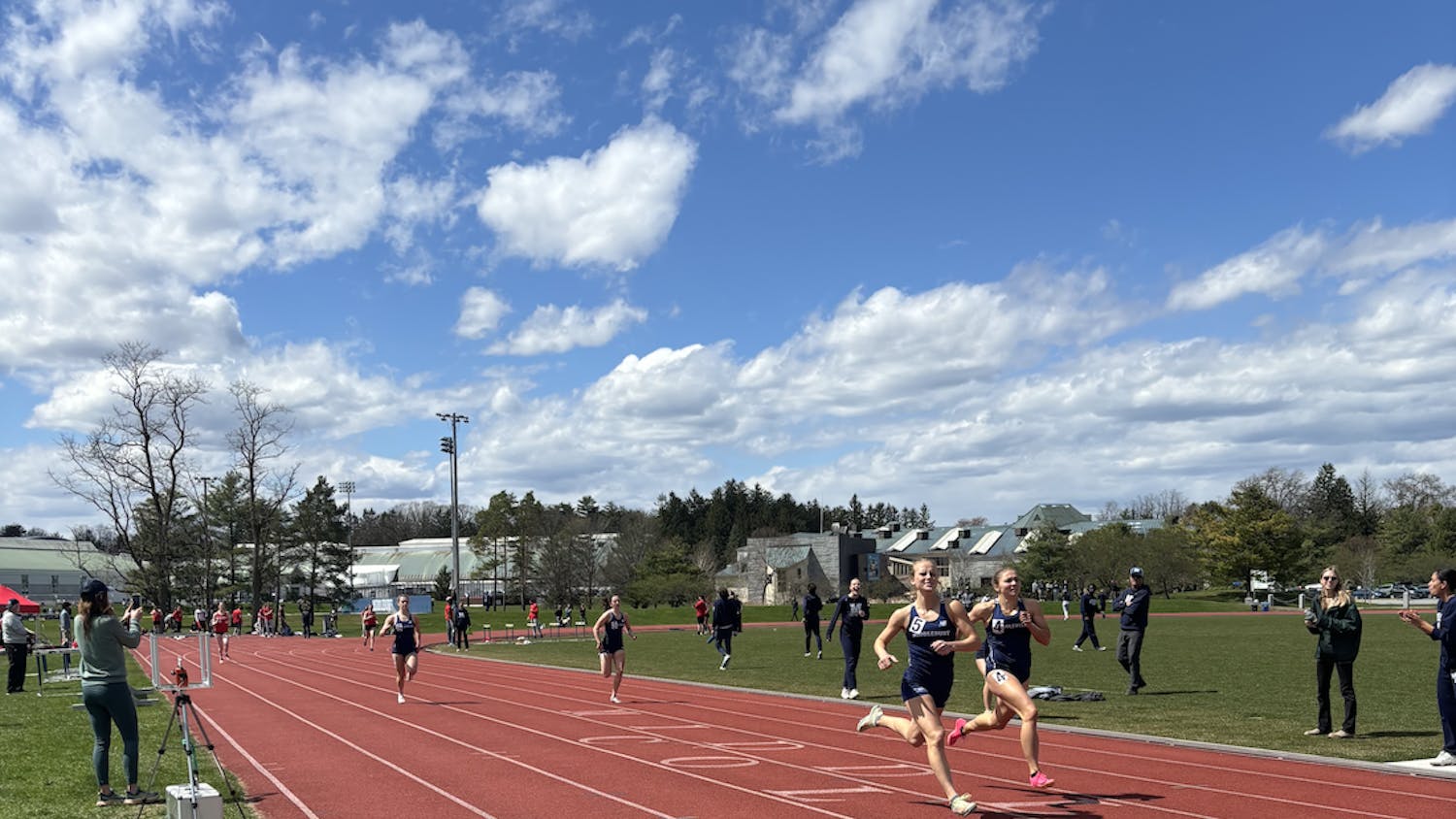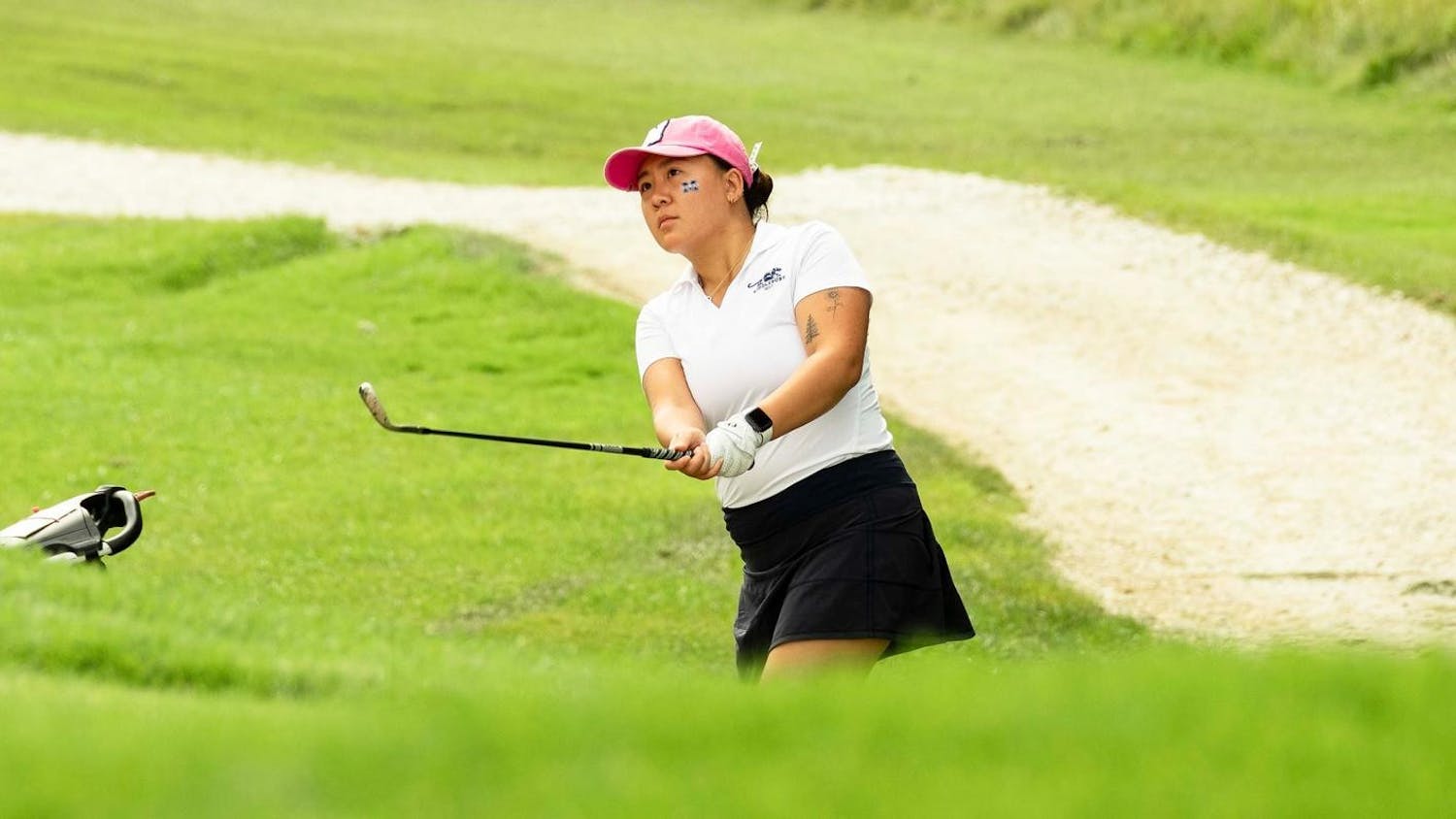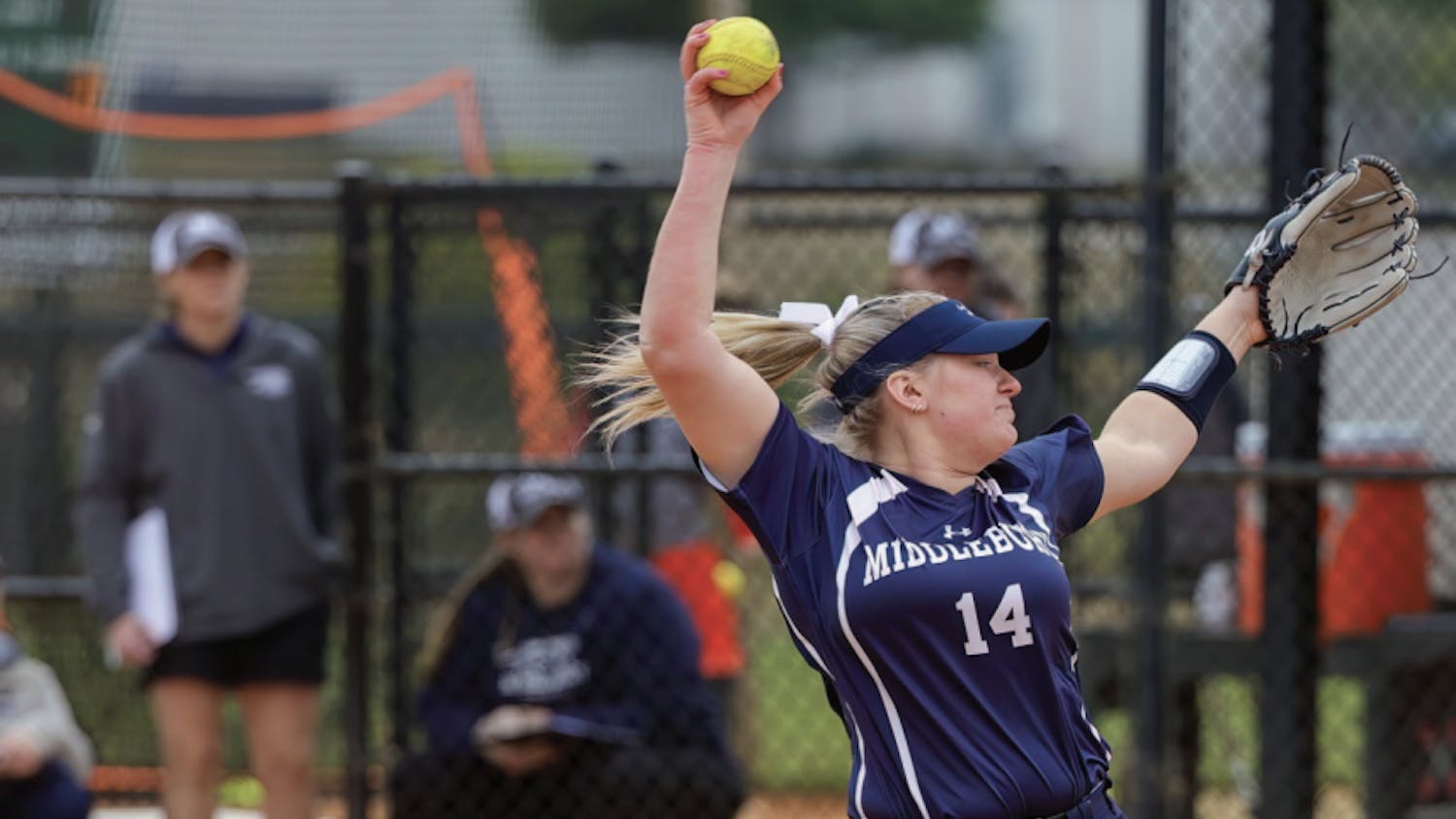Flair: a term that when spoken aloud to some means a rustic pair of good ol’ “bell bottoms.” But that would be “flare,” spelled differently. No, this “flair” is something completely different – not a ’70s fad poking its head in and out of the fashion world as it pleases. To one specific group on campus, this word defines its culture like no other expression can. That group is the Ultimate Frisbee Team, the Middlebury Pranksters.
“Flair” is widely known in the ultimate frisbee world. But how teams choose to incorporate it into their culture varies. Pranksters — both the men and women’s teams — define flair as a word for “atypical” clothing. Whether it is a sparkly tutu or leggings ordained with the anatomy of a leg, anything goes with flair. Flair is anything you want to wear that brings you joy. Grace Kellogg ’22 describes wearing flair as “owning who you are and the way you want to have fun.”
It also allows the teams to bring some levity and excitement to their practices, speaking to the cornerstone of their culture. Have you ever tried to sprint 50 yards in a sparkly tutu? By no means is flair always comfortable to play in. But this tradition goes way beyond the chafing between one’s legs. It provides a sense of community, bringing a laugh or two before that 50-yard sprint.
“It’s a way to not take ourselves too seriously, but at the same time we take what we do very seriously,” said Adrienne Goldstein ’20, one of the team’s captains.
Each year, the Pranksters have a bi-annual “flair pass down” — one at the end of J-Term and one at the end of the spring semester. During this teary-eyed event, graduating seniors give away what they believe to be meaningful pieces of “flair” — items either passed down to them by former Pranksters or ones obtained in a quick run to the nearby thrift store for a last-minute gold mining opportunity. Upon appointing another team member as the bearer of the aforementioned sparkly tutu, the senior recounts tales of the items’ origins.
Articles can include practically anything, whether they are connected to an individual or the team as a whole. Kellogg recalled a senior who found medical scrubs after raiding a thrift store and gifted them to a pre-med student. “You do things that help them feel connected to a community that is a lot bigger than them,” Kellogg said.
To understand the Pranksters and the culture of the team today, it is important to revisit the roots of ultimate. Unlike many other club and varsity sports, frisbee is a relatively new sport, rising to fame in the tumultuous ’60s as a form of counterculture that tried to alter a specific lifestyle. Ultimate was a form of revolt against the uniformity of competitive sports. Rutgers and Princeton battled in the first official collegiate contest in 1972. From the very first moment it was created, the founders were laser-focused on fostering a unique set of values that would set it apart. These virtues of a “letting loose” lifestyle are pronounced in the Pranksters we know today.
The Pranksters are agile both on and off the field. They pride themselves on being dynamic and able to adjust to the needs of each new class it brings in. The central mantra tends to be the idea of inclusivity. An example of this is the way in which the teams constantly reevaluate their culture through their community standards workshop. Previously, the official name of the women’s team was the Middlebury Lady Pranksters. Last year, Goldstein picked up on some tension with regards to the gendered team name, and quickly assembled a poll that she sent out to her team. There was a unanimous vote to change the official name, despite years of its acceptance.
“This team is for the people who are on it now,” Goldstein said. “We obviously love our alumni and value our traditions, but we don’t want to keep traditions just for the sake of it — we had had so much success with that name, but the people that were on the team didn’t like it. Our traditions aren’t static. We never want to put anyone in a vulnerable or uncomfortable position, and that is across the board and the final word.”
The inclusivity continues through the winter. Each J-Term, the Pranksters put on J-Term workshops and create different traditions to combat the cold and darkness that can eclipse January in Vermont. The group does its best to ensure that teammates forget the icy wind chill for just a few short hours each week. The workshops can range from anything like “How to Twerk’’ to a more lowkey “Spa Night.” These are not mandatory, but they provide a more accessible social option. The culture is simple: You are never alone.
However, not all team members experience this attention to inclusivity equally. Last year, an article by Sidra Pierson ’21, written for a J-Term sports journalism course and published in The Campus, highlighted some questions about the team’s emphasis on inclusivity. For some people of color on the team, this focus was not ringing true.
“POC communities have different cultural norms than majority white communities do,” said Divya Gudur ’21, a student quoted in Pierson’s article. “I think the quirkiness sometimes doesn’t fit into POC culture.” If we already stand out, she says, why would we want to draw more attention to ourselves?
“I thought the team was really receptive to Pierson’s article,” said Goldstein. “We shared it in our GroupMe and discussed it (along with other topics) at a community workshop. I think for a lot of white members of the team it forced us to confront the fact that being inclusive of POCs takes more than just being really friendly in interpersonal interactions.”
Goldstein added that she has tried to bear the article in mind as she’s made leadership decisions this year. “In general, we have tried to change the way we discuss and valorize weirdness,” she said. “With wearing flair for example, we are trying to shift away from an attitude of, ‘This is something we all do’ to, ‘This is something you can do if you want.’ However, I think that there is still a lot of work to be done.”
[pullquote speaker="Pranksters captain Adrienne Goldstein '20" photo="" align="center" background="on" border="all" shadow="on"]This team is for the people who are on it now. We obviously love our alumni and value our traditions, but we don’t want to keep traditions just for the sake of it.[/pullquote]
Due to this year’s overwhelming interest in ultimate, the captains resurrected the women’s B team for the first time in four years. This program addition allows more students to be active, competitive and social. This change also helps accommodate the varying levels of the athletes. For instance, being from Seattle, one of the nation’s ultimate hubs, it is only natural that Kellogg is a longtime veteran of the game. She competed on her varsity high school team. This is in stark contrast to those who have never once thrown the disc.
This being said, the program’s decision to expand also had a developmental component. There is the hope that with increased training and instruction, some of these B team members will improve and contribute to the success of the A team. Biology Professor Erin Eggleston is currently coaching the B team.
Goldstein wears a few hats, considering that the A team is coached by students. “Being a captain and a coach at the same time, having to play and also think about the big picture is really really tough,” said Goldstein. “We were the ones that created the A and B teams and have to also act as the emotional support. There is a large amount of emotional pressure put on us ... but it is really rewarding. It is great that it’s student driven in a lot of ways.”
The teams face a multitude of challenges, including insufficient coaches, trainers and funds. The captains have close-to-last dibs on reserving time slots in the fieldhouse, and players are unable to check off a P.E. requirement from participating, regardless of their dedication.
In spite of these hurdles, Pranksters have managed to pull off impressive results. The women went from being unranked two years ago to rounding out the season at nationals in fifth place. The men are coming off a national championship run, and looking to pick up another title at the end of this spring.
“It’s fun to be this team that’s out there, and actually delivering,” Kellogg said.

Even in the unassuming sparkly tutu, they work hard. Really hard. The captains schedule around two A team practices a week on the turf, if they are able to secure the times, and two lifts a week.
Both teams have come a long way. For the women, the goal had traditionally been to get to nationals. Coming off last year’s season and securing fourth in preseason rankings, the goal is now to win nationals. However, they are trying to stay humble and not get too far ahead of themselves.
“We are trying to be more process oriented, than results oriented,” Goldstein said. “We are trying to go into every game confident, but not cocky.”
Hopefully, the Pranksters will be able to show what they are capable of in the upcoming months, whether they are leaping up to the disc in medical scrubs or neon capes. The constant commitment to developing their unique culture will only increase their chances of succeeding.
“[We] are one of the only D3 teams that can be both competitive and goofy,” Kellog said. “You put on your flair and you’re ready to run.”
A link to their fundraiser: http://sites.middlebury.edu/ultimate/leadership/
The Middlebury Pranksters: The ultimate experience

Sophia McDermott-Hughes
Comments



